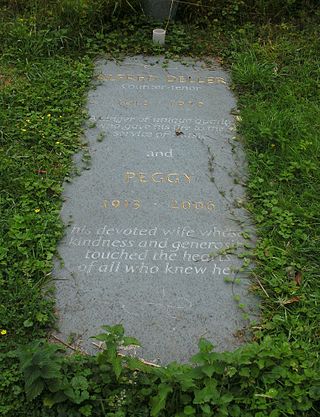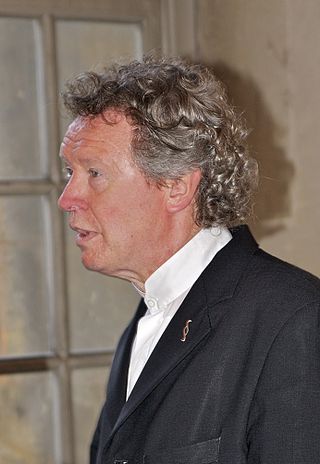Related Research Articles
A countertenor (also contra tenor) is a type of classical male singing voice whose vocal range is equivalent to that of the female contralto or mezzo-soprano voice types, generally extending from around G3 to D5 or E5, although a sopranist (a specific kind of countertenor) may match the soprano's range of around C4 to C6. Countertenors often have tenor or baritone chest voices, but sing in falsetto or head voice much more often than they do in their chest voice.

Alfred George Deller, CBE, was an English singer and one of the main figures in popularising the return of the countertenor voice in Renaissance and Baroque music during the 20th century.

Ode for the Birthday of Queen Anne is a secular cantata composed by George Frideric Handel to a libretto by Ambrose Philips, of which the first line, "Eternal source of light divine", provides an alternative title for the work. It was probably composed during January 1713 for a performance on 6 February 1713, although there is no record of the performance having actually taken place. Other catalogues of Handel's music have referred to the work as HG xlvi A; and HHA i/6.
SATB is an initialism that describes the scoring of compositions for choirs, and also choirs of instruments. The initials are for the voice types: S for soprano, A for alto, T for tenor and B for bass.
James Thomas Bowman was an English countertenor. His career spanned opera, oratorio, contemporary music and solo recitals. Arguably, he was after Alfred Deller the most important countertenor in the 20th century revival of the voice part. He combined early and baroque repertoire with contemporary work, becoming recognised for his portrayal of Oberon in Britten's A Midsummer Night's Dream and performing world premieres.

The Fairy-Queen is a semi-opera by Henry Purcell; a "Restoration spectacular". The libretto is an anonymous adaptation of William Shakespeare's comedy A Midsummer Night's Dream. First performed in 1692, The Fairy-Queen was composed three years before Purcell's death at the age of 35. Following his death, the score was lost and only rediscovered early in the twentieth century.

Richard Henry Tudor "Harry" Christophers CBE FRSCM is an English conductor.
Robin Blaze is a British countertenor.
Elin Manahan Thomas is a Welsh soprano. A specialist in Baroque music, she sang at the wedding of Prince Harry and Meghan Markle in May 2018.
Charles Daniels is an English tenor, particularly noted for his performances of baroque music. He is a frequent soloist with The King's Consort, and has made over 25 recordings with the ensemble on the Hyperion label.
April Rosemary Cantelo is an English soprano.
Grayston Burgess (Cheriton, Kent 7 April 1932 – 6 March 2019 was an English countertenor and conductor.

Ben Parry is a British musician, composer, conductor, singer, arranger and producer. He is the Director of London Voices and was formally Artistic Director of the National Youth Choir.

The Stour Music Festival is a festival of early music held in the Stour valley, Kent, England, founded by countertenor Alfred Deller in 1962. The principal venue is a medieval church, All Saints' Church, Boughton Aluph. The building has good acoustics and was used for some of Deller's recordings.
Come Ye Sons of Art, Z.323, also known as Ode for Queen Mary's Birthday, is a musical composition by Henry Purcell. It was written in 1694, and is one of a series of odes in honour of the birthday of Queen Mary II of England. The text of the ode is often attributed to Nahum Tate, who was poet laureate at the time.
Peter Thomas Nardone BA FRCO is primarily a freelance conductor, singer and composer. He has sung with the Monteverdi Choir, The King’s Consort and the Tallis Scholars. He has been Director of Music at Chelmsford Cathedral and was subsequently Organist and Director of Music at Worcester Cathedral.
Rogers Henry Lewis Covey-Crump is an English tenor noted for his performances in both early music and contemporary classical music. He has sometimes been identified as an haute-contre tenor. He has performed for over 50 years in choirs and ensembles such as the Hilliard Ensemble, and as a soloist. He has been especially in demand for the part of the Evangelist in Bach's St Matthew Passion and St John Passion. He also specialises in vocal tuning, and has written articles on the subject.
Geoffrey Mitchell is a countertenor-voiced chorister and choral conductor.
Welcome to all the pleasures, Z. 339, is a 1683 composition by Henry Purcell, the first of a series he wrote in honour of the patron saint of music, Saint Cecilia. It was commissioned by an organisation called "The Musical Society" for performance in London on 22 November 1683.
John Anthony Whitworth was an English countertenor, organist, and teacher of music. He was a lay vicar at Westminster Abbey and a professor at the Guildhall School of Music.
References
- ↑ "Mark Deller and the Stour Festival". Kent Life (kent-life.co.uk).
- ↑ "Ashford Choral Society - Mark Deller". Ashfordchoral.org.uk. Retrieved 1 July 2020.
- ↑ "Mark Deller". Ashfordchoral.org.uk. Retrieved 1 July 2020.
- ↑ "Purcell Odes". Gramophone. Retrieved 20 November 2017.